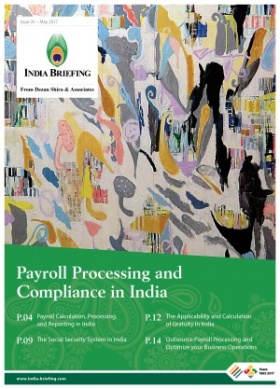Antitrust Law in India: A Primer for Foreign Companies
India’s antitrust law, The Competition Act, 2002, was fully constituted on March 1, 2009 – replacing the Monopolistic and Restrictive Trade Practices Act of 1969. The Competition Act monitors any economic activity that monopolizes competition within the market; it aims to protect consumers and small enterprises, and ensures the freedom of trade.
The Act also regulates acquisitions, mergers, and combinations in India.
What is prohibited under the Competition Act?
The Competition Act prohibits any business arrangements that could form a nexus within the chain of supply, distribution, storage, acquisition, control of goods, or provisions of services.
While India’s laws do not prohibit ‘dominance’, its abuse through price manipulation, exploitation, or exclusion is prohibited. An establishment has a dominant position if it can influence competitors or consumers to its advantage.
Thus, the Competition Act guarantees that no enterprise abuses their ‘dominant position’ in a market through the control of supply, manipulating purchase prices, or adopting practices that deny market access to other competing firms.
How does it affect entry into India?
A foreign company seeking entry into India through an acquisition or merger will have to abide by the country’s competition laws.
Assets and turnover above a certain monetary value will bring the group under the purview of the Competition Commission of India (CCI). CCI approval is required within 30 days of a proposal being set for any form of merger or acquisition, before it can become actionable. In case of a merger, both parties must jointly seek approval of the CCI. In case of an acquisition, the acquiring firm is responsible for obtaining the approval.
In case of a merger, both parties must jointly seek approval of the CCI. In case of an acquisition, the acquiring firm is responsible for obtaining the approval.
However, in case of a hostile takeover, the acquirer need only provide the CCI with the information that is available to them. The CCI will then notify other parties involved to supply more information, as required.
Joint ventures (JVs) are exempt from seeking approval if the assets being shared are not over the prescribed limits in India.
The process to file for approval is through:
- Form 1 and a fee submission of US$800 (Rs 50,000); or,
- Form 2 and a fee submission of US$1,600 (Rs 100,000).
Either form can be filed. However, the CCI may request that Form 2 be submitted, in case more detailed information is required.
Applicants can use the CCI’s online portal to file the required documents. CCI also provides a facility for pre-filing consultation. After filing the application, the company will receive an approval within 30 days.
If the CCI decides that the deal negatively affects competition in India, a detailed investigation will take place, and an answer will be given within 180 days – either in the form of a rejection or suggestions to modify the agreement to make it compliant.
Other exemptions provided in the acquisition of shares, control, or voting rights can be found here.
Does it affect companies operating outside of India?
CCI has the authority to notify organizations that sell to India if it feels they may be negatively influencing competition in India’s domestic market.
If there has been any breach of the Competition Act or international ‘cartel’ activity that causes the manipulation of prices or market access in India, the CCI has authority to penalize or shut down these operations. CCI and representative bodies of other countries have signed several MoU’s (Memorandum of Understanding) to uphold these laws internationally.
The law also applies to foreign companies merging with or acquiring other international companies that have a stake in any Indian company.
If, through this merger or acquisition, the parent company falls under any of the threshold categories mentioned in the Competition Act (see table), CCI approval must be procured for the M&A activity to continue.
Compliance under the Competition Act
The Competition Commission is India’s competition regulator, and an anti-trust watchdog for smaller organizations that are unable to defend themselves against large corporations. The CCI has resolved over 650 cases since its inception in 2009, imposing some of the highest fines in the world on violators.
If an enterprise is found guilty of breaching the Act, the CCI can impose fines up to 10 percent of the average turnover of the preceding three years. In case of cartel agreements, it may extend to more than 10 percent and up to three times the profit made through the entire period of the cartel agreement.
Earlier this year, the CCI imposed a fine of US$20 million (Rs 136 crore) on Google for the violation of competition laws through the abuse of its dominant position. This is a clear example of why international companies operating in India need to adhere to the country’s competition laws, and the consequences of non-compliance.
CCI can also levy fines if a company refuses to cooperate with an ongoing investigation. In November 2017, the CCI held Monsanto and three of its units to be in breach of the Competition Act. A fine of US$300,000 (Rs 2 crore) was levied for being unable to provide the requisite information when CCI demanded it.
Foreign companies should note that the Competition Act is strictly enforced in India. Such anti-trust regulations prevent large multinational corporations, both domestic and international, from gaining undue advantage in the Indian market, and also seek to protect small enterprises.
About Us
India Briefing is published by Asia Briefing, a subsidiary of Dezan Shira & Associates. We produce material for foreign investors throughout Eurasia, including ASEAN, China, Indonesia, Russia, the Silk Road, & Vietnam. For editorial matters please contact us here and for a complimentary subscription to our products, please click here.
Dezan Shira & Associates provide business intelligence, due diligence, legal, tax and advisory services throughout India and the Asian region. We maintain offices in Delhi and Mumbai and throughout China, South-East Asia, India, and Russia. For assistance with India investment issues or into Asia overall, please contact us at india@dezshira.com or visit us at www.dezshira.com.
- Previous Article India’s IT Sector – Growing Opportunities for Investment
- Next Article India’s Solar and Wind Power Industries: Scope for Investors











